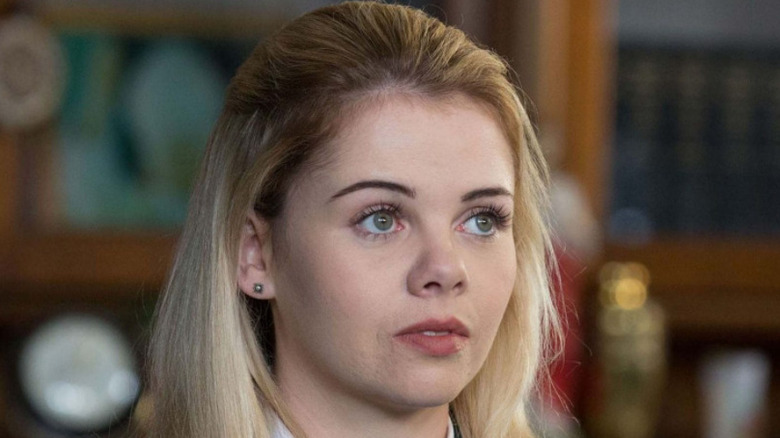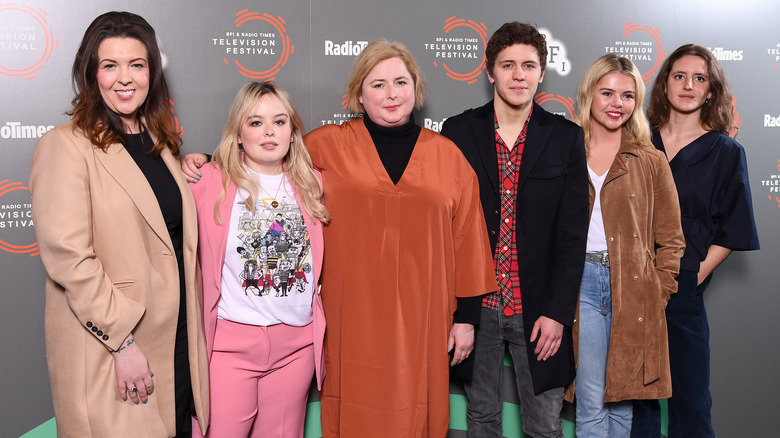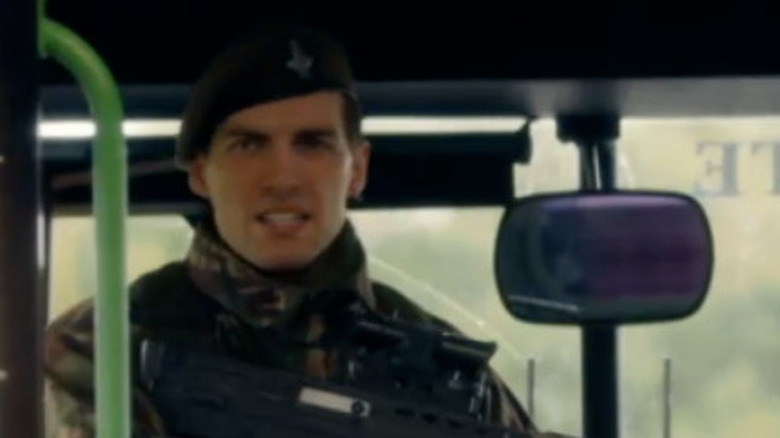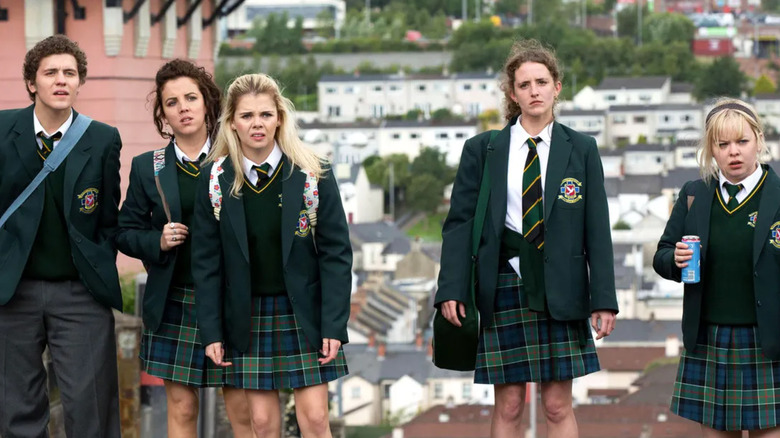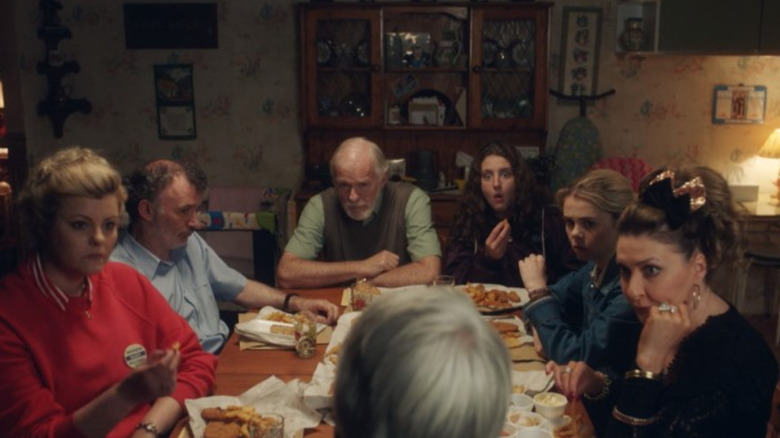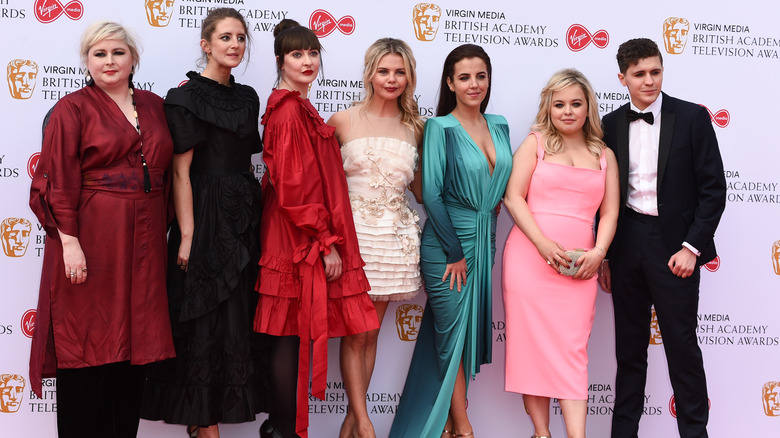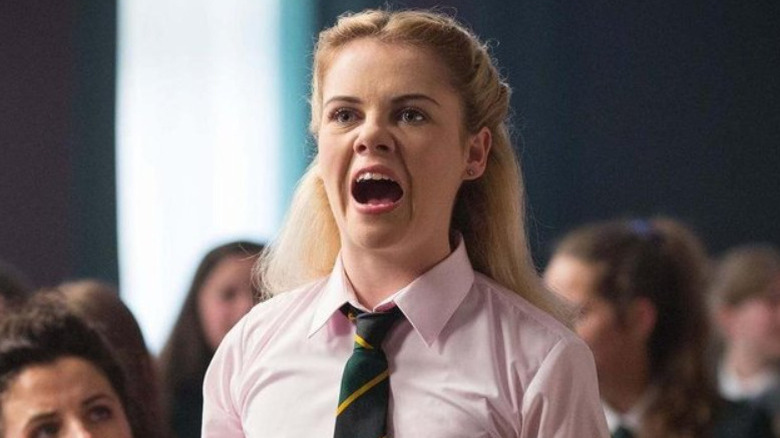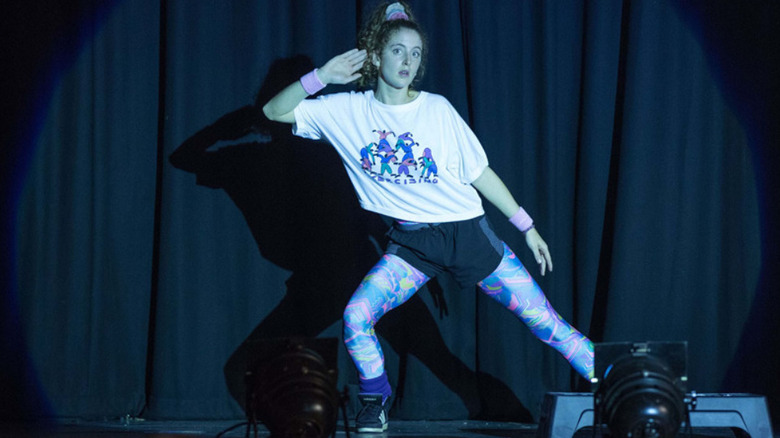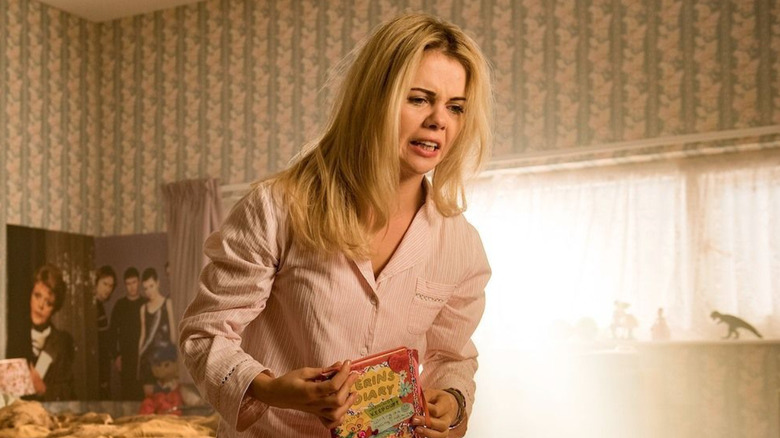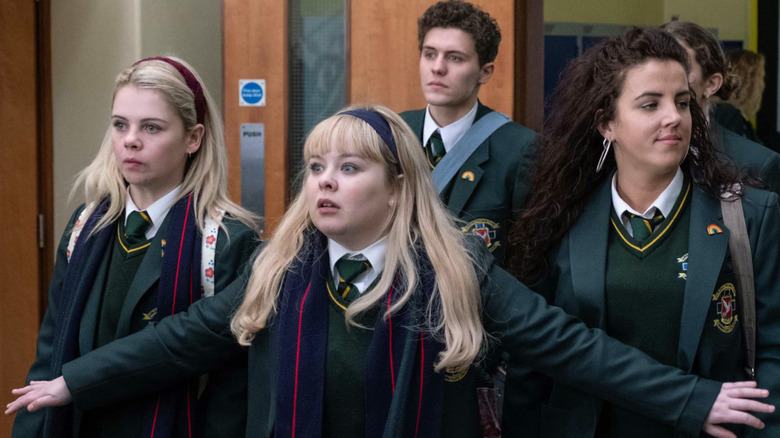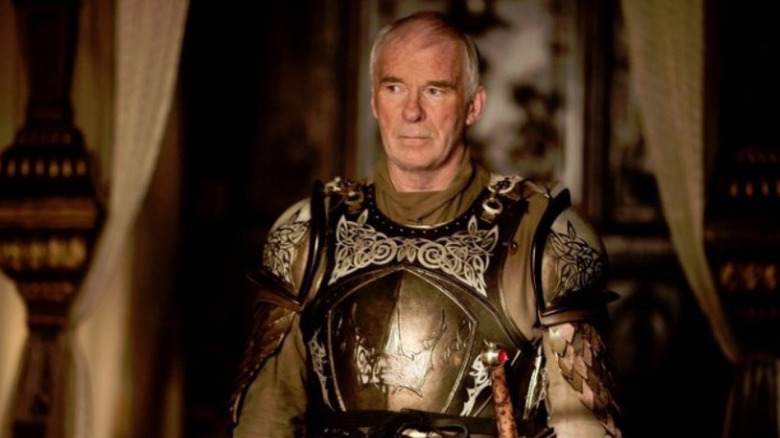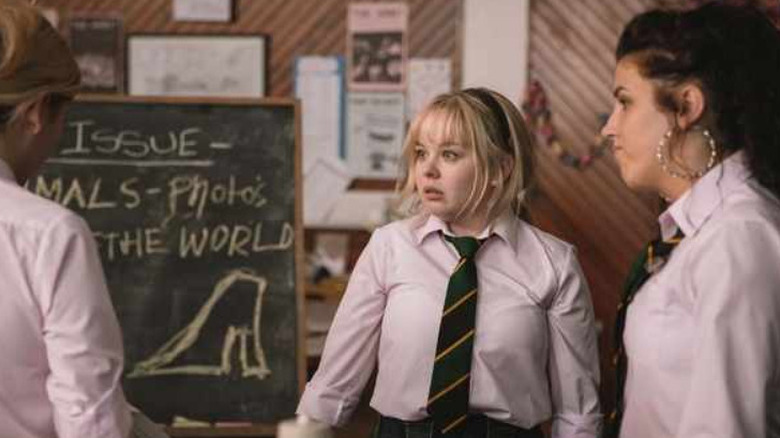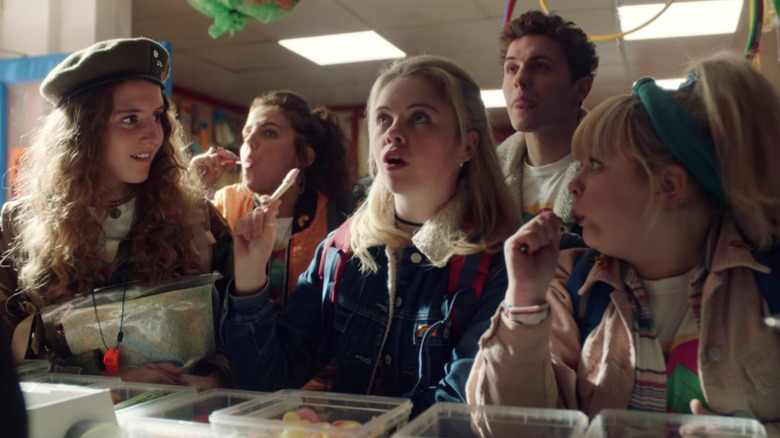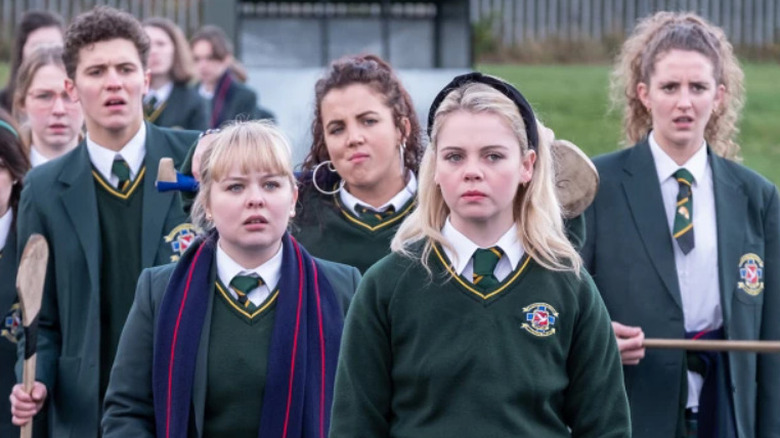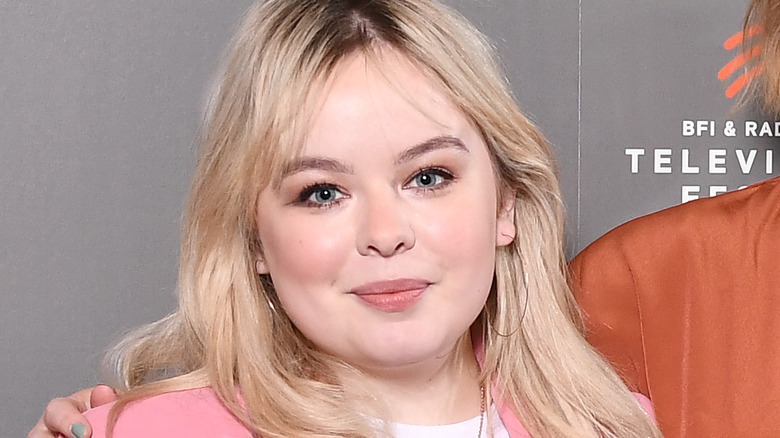The Untold Truth Of Derry Girls
On December 21, 2018, Netflix unveiled a new show on their steaming platform named "Derry Girls." The six-part first season depicted the lives of a group of schoolgirls growing up in Derry, Northern Ireland, during the 1990s. The show was a curious mix, focusing on the day-to-day preoccupations of its teenage characters, while also hinting at the sectarian violence that shook Northern Ireland at the time.
This blend of the comedically mundane and the tragically grim made "Derry Girls" an instant standout for world audiences, despite the difficulty that many even in English-speaking countries felt in understanding the highly region-specific accent and slang that the series makes plentiful use of. With the release of its second season, "Derry Girls" climbed even higher on the popularity charts, winning a slew of awards and making stars of its main cast.
Unfortunately, the creator of the show, Lisa McGee, recently announced that the upcoming third season of the show will be its last. While the fandom mourns the news, let's take a look back at the lesser-known high points of "Derry Girls" that made it one of the most uniquely brilliant shows to come out of the UK in the past decade.
A deeply personal story for the creator
"Derry Girls" takes place at a highly specific point in space and time. Although many films and TV shows have followed The Troubles ("The Crying Game"), a period of ethno-nationalist conflict that raged from the late 1960s to 1998, the particular milieu of "Derry Girls" — an all-girls Catholic secondary school in Northern Ireland — has received scant attention in the past. The main characters Erin, Orla, Clare, Michelle, and James all attend school together and live close to each other in the titular Derry.
The fact that the fictional show is based on real events that caused so much pain and trauma to several generations of families in Northern Ireland means the writers of "Derry Girls" had to walk a fine line between humor and sensitivity. Despite the difficult subject matter, the show's creator Lisa McGee felt compelled to make the series as true-to-life as possible, based on her own experience of growing up in Derry during the height of "The Troubles."
"I used to say, when I started writing, that I'd never write anything set during The Troubles," McGee explained to British Comedy Guide. "because I'd had enough of how where I'm from was presented. And then I just thought 'someone needs to show the other side of it — that these people are funny. You never got to see that side of Northern Ireland.'"
Worries about political jokes
"Derry Girls" doesn't flinch at the darker aspects of growing up in the thick of "The Troubles." The series makes several direct references to the rivalry between different factions involved in the conflict and shows how they affect the lives of the protagonists in unexpected ways.
For instance, on the one hand, we see Army checkpoints across various points in Northern Ireland manned by soldiers keeping a wary eye out for dissidents. But on the other, we see Erin and her crew flirting with those same soldiers because of their hot uniforms. It's an important scene, showing the girls' irreverent youth and naïve innocence, but it leaves you uncertain whether to laugh or feel uncomfortable. And the show's creator Lisa McGee was definitely aware that certain viewers could take such scenes the wrong way.
"Worried is probably an understatement," McGee admitted when asked if she had any concerns about people's reactions to the show's more daring political elements. "Petrified is more accurate... But thankfully everyone just got the joke, and appreciated the tone of it. And because the lines were being said by characters who are teenage girls, people were all the more accepting of it, because they're just kids. So, I think that helped — you got to say what you really wanted to say, but through the mouths of these young people."
A troubled start to production
While many studios make do with filming shows on sound stages, "Derry Girls" creator Lisa McGee knew her show needed to be shot on location to authentically capture the wild beauty of Northern Ireland. Thus, the series was filmed on location in Belfast, Derry, Hunterhouse College, Limewood Street, New Barnsley Park, and other parts of the region.
Naturally, filming on location carried its own set of complications. For instance, BBC reported in 2018 that a number of traders had objected to a temporary road closure that was required for filming on Shipquay Street in Derry for two days. The show's producer, Channel 4, had to step in to defuse the situation and assure the local population with a written statement that the filming schedule would create as little inconvenience as possible.
Fortunately, the show exploded in popularity soon afterward, which made filming the next season a much smoother affair since the locals were now actively welcoming the cast and crew. "In Derry it's a different story," Louisa Harland, who plays Orla, told Belfast Telegraph. "We are The Beatles [in terms of fan attention] there, but nowhere else are we like that."
Too funny to work through
"Derry Girls" is a rare production that lets the comedic wit of its all-female lead cast shine. The show also offers a talented array of male actors and comedians. Tommy Tiernan is one such famous actor and comedian. He plays Erin's long-suffering father Gerry with a pitch-perfect mixture of good humor and resignation.
Despite being a seasoned comedian, Tiernan admitted during an interview with British Comedy Guide that there was one particular actress who was so irresistibly funny that he could not keep himself composed in their scenes together. Kathy Kiera Clarke plays the role of Aunt Sarah, Orla's dreamy, blunt mother, who often finds her views at odds with those of the more pragmatic Gerry.
Although the scenes between Sarah and Gerry are comedy gold, they are difficult for Tiernan to get through. "I had real difficulty with laughing during the scenes," the actor admitted. "Myself and Kathy had to come to an arrangement after the first week that we were no longer able to make eye contact with each other, her character is so ridiculous and she pulls it off so realistically that I just wasn't able to look at her without giggling."
Older than they look
"Derry Girls" continues in the proud tradition of American shows that depict teenagers being played by actors in their 20s and 30s. The main five characters on the show are all supposed to be in high school, which would put their age in the story at around 15 or 16.
In reality, Saoirse-Monica Jackson (Erin Quinn) and Louisa Harland (Orla McCool) were 24 years old when they were cast in "Derry Girls." Jamie-Lee O'Donnell, who plays Michelle Mallon, was 26, while Dylan Llewellyn, who portrays James Maguire, was 25. But the biggest surprise for fans was finding out that cherubic little Clare, who looks to be the youngest of the group, was actually played by 31-year-old Nicola Coughlan.
Despite all of them being about a decade older than their characters, the main players of "Derry Girls" have expertly portrayed the angst and ecstasy of the teenage years — though meeting actual 16-year-olds put Louisa Harland in a bit of a crisis mode. "It was quite real in that respect," the actress told British Comedy Guide about being able to shoot in real locations to add to the authenticity of the series. "The extras as well, what often bothers me is they are often the age we're meant to be playing. But I think it probably helped me feel more odd and Orla like."
Everyone needs subtitles
One of the most unusual aspects of the success of "Derry Girls" is how global its reach has become despite originally being seen as a niche show for a niche audience. To that end, the show's creator Lisa McGee did not try to smooth out the distinctive edges of the show, which include very strong Irish accents and regional slang.
The result is that even other English-speaking countries where "Derry Girls" airs need subtitles to make sense of the dialogue. When Netflix bought the rights to the series, they made sure to include subtitles everywhere the show aired. Unfortunately, even those subtitles weren't able to get every line right.
"People said for the first two or three episodes they had to watch it with subtitles," Saoirse-Monica Jackson informed British Comedy Guide, "and then after that they were fine... I've seen one bit where they got the subtitles wrong. Jamie Lee calls Nicola a shite-the-tights, and they've understood it wrong and written it as 'sugartits.'"
Louisa Harland wept after seeing her own scene
"Derry Girls" has received consistent praise for ably mixing the comedic with the tragic without diluting the impact of either. One of the best examples of the show's ability to do so can be seen in the Season 1 finale. Erin and her friends take to the school stage to support Orla in her strange dance routine, while back home, their parents witness news footage of a bombing by militant factions that puts the entire region on lockdown.
The juxtaposition received particular praise from critics, and word of mouth about it helped attract a wider audience for the show. Such was the popularity of the scene that an audience poll by RadioTimes voted it the readers' top television scene of the year in 2018. The linchpin of the scene is Orla and her innate confidence. Harland herself was moved to tears when she watched the scene in its final form.
"It's a great moment," Louisa Harland told British Comedy Guide. "I cried the first time I watched it on television. It's beautifully moving and that is all Lisa [McGee]." Harland also explained that she was conscious of the importance of the scene, and made sure to practice her moves endlessly to do justice to the weight of the moment.
A companion book from Erin's POV
Nowadays, franchise-building has become a multimedia affair, with TV shows frequently branching out into video games, comics, etc., to reach a wider audience. "Derry Girls" took the old-fashioned approach to this marketing strategy: The show's creator Lisa McGee released a "Derry Girls" companion book in 2020 titled "Erin's Diary: An Official Derry Girls Book."
As the name suggests, the book takes the form of Erin's personal diary filled with her teenage thoughts about herself, her friends, and the general tragedies of teen girlhood. McGee ably captures Erin's naïve and self-centered voice, and the book is filled with hilarious anecdotes like having a crush on a priest, faking a miracle once, and accidentally breaking an important relic.
Despite Erin's eagerness to see herself as a world-wise person of deep intelligence and maturity, she largely ignores the sociopolitical problems of the times and focuses on mundane gossip from her personal life that unconsciously mirrors her insecurities. "Nothing happens in Erin's life, really," McGee explained to The I. "She has to make a drama out of crap. And that was like my life. Erin will change her opinion in one second, depending on who she's trying to impress. That felt very true to me as a teenage girl. I just didn't know myself."
Real-life inspiration for Clare
Lisa McGee has been open about the fact that "Derry Girls" draws large amounts of inspiration from her own life growing up in Derry during The Troubles era. While Erin's character was inspired by McGee herself, her companions were based on girls the creator knew in school. McGee still shares a close enough bond with those people that Nicola Coughlan was able to meet the real-life inspiration for her character, Clare.
"I've met the real-life girl Clare was based on," Coughlan shared with British Comedy Guide, calling the experience "bizarre" and admitting to feeling star-struck by the encounter. "I don't think that she was flattered in the beginning [for inspiring the creation of Clare]." Given the fact that Clare is often shown to be scared, uptight, and willing to sell out her friends to get in the good books of adults, it is understandable that being known as the real-life Clare would not be a pleasant experience.
Still, the person did meet with Coughlan to discuss the now world-famous character they both have a connection to. "When we had a drink, she said to me 'I was the original 'Shite-the-Tights.'"
The Game of Thrones connection
If "Derry Girls" is the plucky little indie gem of the season, "Game of Thrones" is the massive blockbuster franchise that all other blockbuster television is measured by. But despite their wildly different genres and aesthetics, the two shows have more in common than you might realize.
Both shows film a portion of their stories in the wilderness surrounding Derry and Belfast. Part of the reason why "Derry Girls" was shot there was that "Game of Thrones" had boosted the filmmaking infrastructure of the region, which the smaller show used to its advantage. Additionally, actor Brenock O'Connor played the role of a student on "Derry Girls," but "Game of Thrones" fans will remember him best as Olly, the kid who killed Ygritte and was the final person to stab Jon Snow during the Night's Watch rebellion. Finally, there is Ian McElhinney, who plays Grandpa Joe on "Derry Girls" and portrayed Barristan Selmy on "Game of Thrones."
Despite so much overlap, the cast members of "Derry Girls" were not actually able to actually meet any of the main cast from "Game of Thrones." "We didn't [meet the GoT cast], sadly," Dylan Llewellyn, who plays James on "Derry Girls," told GQ. "We were praying we would be. Well, I was. I don't know about the girls. I was thinking, 'Oh god, I want to meet Jon Snow.' But we had quite a lot of the same crew from 'Game of Thrones.'"
Nicola Coughlan was already aware of Clare's secret
One of the biggest curveballs that "Derry Girls" threw at the audience was the revelation in Season 1, Episode 6, that Clare was the "wee lesbian" who had the whole school in a flutter after she penned an anonymous letter revealing her secret orientation. The reveal threw many fans for a loop, but according to Nicola Coughlan, the fact that her character is gay had been a part of her narrative since the start.
"I knew Clare was gay from when I very first got the audition," Coughlan explained to British Comedy Guide. She went on to admit she was the only member of the cast who knew the secret all the way back in 2016, and when the other actors found out, they were just as surprised as Erin and her crew on the show itself. Still, despite keeping it a secret for most of the season, Coughlan revealed that there were hints scattered throughout the season regarding Clare's sexuality.
"I tried to play it subtly throughout the whole series," said Coughlan before explaining some of the clues Clare dropped in earlier episodes. "So, things like David Donnelly is meant to be the hottest guy in Derry, but Clare had literally no interest in him and just wants to get on the school bus. And Charlene Kavanagh is the prettiest girl in school, and Clare kind of stands behind Erin and waves nervously."
Erin's letter was based on a true incident
Erin's personality is a sometimes exasperating and sometimes touching combination of high-mindedness and childishness. She seems to believe the world revolves around her own interests (she is, after all, a teenage girl). To that end, when Erin hears Bill Clinton is going to visit Derry, she wastes no time in writing to the president's daughter Chelsea, confidently expecting them to spend the day together.
In reality, Lisa McGee had actually written to Chelsea Clinton when she was 13 years old, and decided to incorporate the incident into the show. At the time, President Clinton was preparing to come to Derry in a show of support for the ongoing peace process, marking the first time a U.S. president visited the region. McGee saw it as an opportunity to make a new friend, and so she wrote to the daughter of the president to invite her to watch a film together at the city's Strand movie theater.
"She never replied," McGee admitted to The New York Times. "The innocence of that. Living in this place that's violent and scary, but we were these 'eejits' running about writing letters to Chelsea Clinton." Fortunately, McGee was able to turn that disappointment into a memorable story for her show.
Immortalized in real life
When "Derry Girls" first came out, no one expected it to become the worldwide phenomenon it eventually did. The show opened up the world of Derry and Northern Irish culture to the rest of the globe, and in the process gave residents a feeling of pride and ownership over a piece of pop culture that has entranced critics and general audiences alike.
To mark the cultural landmark that "Derry Girls" has become, the show was honored by a giant mural depicting Erin and her four friends. The mural is part of a tradition in Northern Ireland of painting murals on the sides of buildings depicting the region's cultural and political history.
"It's done wonders for Derry," Karl Porter, one of the artists who made the mural told Belfast Live. "Not just the mural but Derry Girls alone." According to Porter, the mural has become a popular tourist attraction for fans from all over the world who came to know about Derry through the show and wanted to dig into the cultural history of the city.
A movie in the offing?
While fans aren't ready to say goodbye to Erin and her crew yet, McGee has assured her followers that ending the show now was always part of the plan.
Still, while there won't be a Season 4 of "Derry Girls," that doesn't mean the story has to end for Erin, Orla, Clare, Michelle, and James. While speaking to The Irish Mirror in 2020, McGee hinted that she had something in mind for a "Derry Girls" movie. "For awhile I was kind of like, I dunno will it work. But now an idea [for a movie] is starting to vaguely form in my head."
Even while making the official announcement recently regarding the third "Derry Girls" season being the final one, McGee had been careful to hint that fans might not see the last of Erin's crew just yet by adding, "Who knows if Erin, Clare, Orla, Michelle, and James will return in some other guise someday, but for now this is it for us." All hope is not lost, and we might yet get to see even more adventures of the Derry Girls after the original series concludes.
